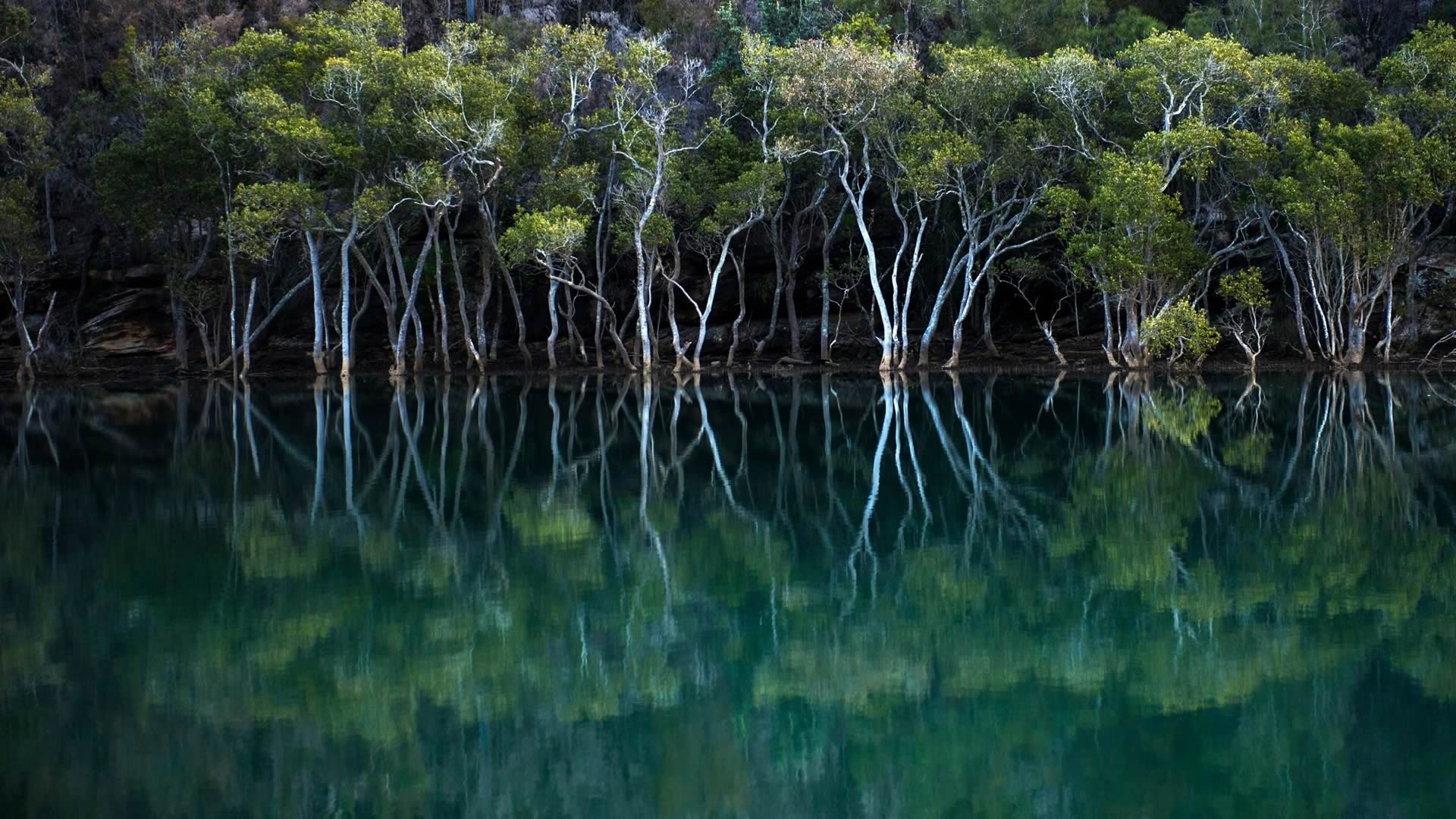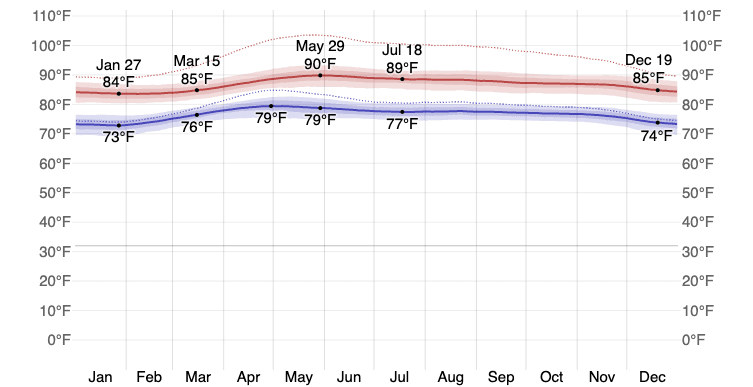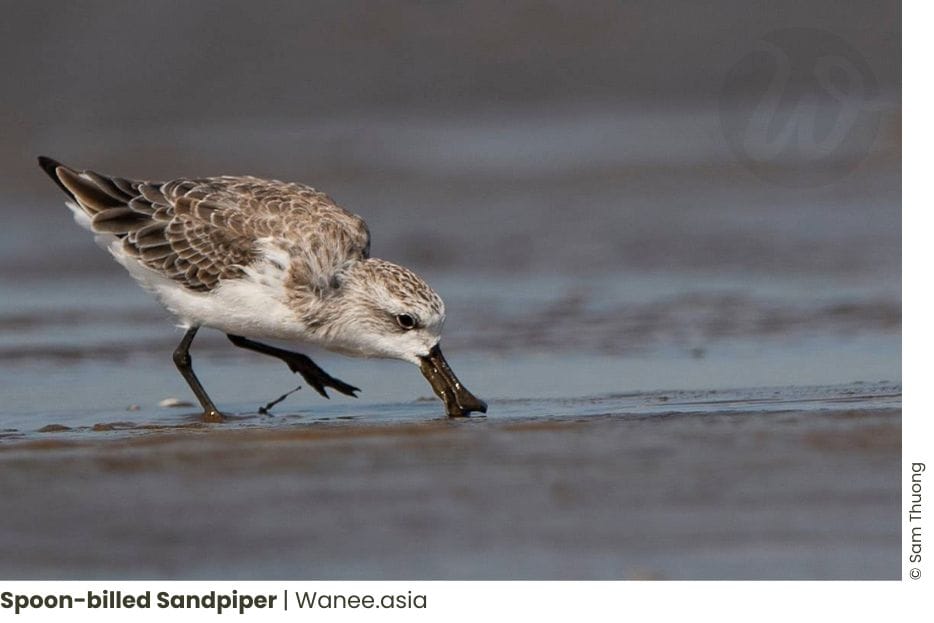Why birding in Can Gio Mangrove?
Can Gio Mangroves, where water and land meet, offer a unique birding experience. While the planted mangroves may not attract many key bird species, the intertidal mudflats and sandbanks are the real highlights. This is why these areas provide important stopovers for migratory waterbirds, creating a fascinating sight for bird enthusiasts.

What to see?
Bird fauna Can Gio Mangrove
Several rare waterbird species have been recorded at this site, including Spotted Greenshank, Asian Dowitcher, Spot-billed Pelican, and Painted Stork. In addition, the globally endangered Black-faced Spoonbill has been recorded at the site, although it is not believed to regularly occur in large numbers.
Most highlights Birding in Can Gio Mangroves
Keep an eye out for Painted Stork, Nordmann’s Greenshank, Asian Dowitcher, Spoon-billed Sandpiper, and a variety of shorebirds that make this area a great spot for birding.
When is the best time for birding in Can Gio
Before birding, we must know:
Can Gio Climate
In Can Gio, the dry season is warm, windy, and partly cloudy, but the wet season is hot and overcast. In general, it is oppressive year round. Over the course of the year, the temperature typically varies from 73°F to 90°F and is rarely below 69°F or above 93°F.
Based on the beach/pool score, the best time of year to visit Can Gio for hot-weather activities is from mid December to late March.
Monthly Averages
Historical monthly average weather conditions for Can Gio.

“The best time for birding in Can Gio is from November to March, when rainfall is low, and migratory birds are most active.“
Where birding in Can Gio Mangrove
Birding Routes
When it comes to birding in Can Gio Mangrove, you’re in for a treat, as this unique ecosystem provides a great opportunity to spot a wide variety of bird species. Let’s embark on a birding journey to explore its diverse habitats:
Mangrove Forest: A Tranquil Avian Haven
Along the winding path through the mangrove forest, the Blue-winged Pitta moves silently in the shaded undergrowth, and the Mangrove Whistler fills the air with its gentle song. When looking up, you may happen to see the Laced Woodpecker climbing tree trunks or Treepies gliding through the branches. Among the flowers, Sunbirds flash their bright colors, bringing life to this peaceful sanctuary.
Intertidal Zones: A Winter Wonderland for Migratory Birds
Venture further into Can Gio, you will go through the coastal beauty of Ky Nam stretching across wide intertidal mudflats. In winter, this area comes alive when thousands of shorebirds gather and fill the landscape with movement and sound.
Since these mudflats provide a resting and feeding ground for migratory birds, you can come closer to spot them. Keep an eye out for the Asian Dowitcher, a rare visitor with a slender bill and striking plumage, blending in among the flocks as it feeds.
Salt Pans: A Coastal Avian Marketplace
Continuing along the main road, you’ll stumble upon another avian treasure – The salt pans. Here, especially during high tide, the scene transforms into a bustling marketplace of avian life. The shimmering waters of the salt pans mirror the skies above, creating a surreal vista. It’s a realm where wading birds like Stilts, Plovers, and Sandpipers gather in abundance, probing the salty waters for sustenance.

Gulls, Terns, and the elegant Black-winged Stilt partake in this coastal banquet. While the Spoon-billed Sandpiper, with its distinctive spoon-shaped bill, graces the waters, the majestic Painted Stork may make an occasional appearance.
Wetland Marvels: The Maison with Avian Delights
As your birding journey continues in Can Gio, don’t miss the Maison Wetland, a thriving haven of avian diversity. Listen for the cheerful chatter of the Asian Golden Weaver, skillfully weaving its nest among the reeds, while the Streaked Weaver fills the air with its lively courtship calls.
Along the water’s edge, the shimmering stillness is punctuated by the swift dives of the Common Kingfisher and the graceful presence of the Little Grebe and Lesser Whistling Duck. Here, you can scan the waters for Cormorants, Ibises, Storks, and Bitterns, each engaged in their elegant pursuits.
Whether exploring the beautiful mangroves, watching the winter gathering of shorebirds on the mudflats, or discovering the rich wetlands of Maison, Can Gio unfolds as a vibrant tapestry of birdlife, where each habitat tells a unique story, each visit reveals new wonders.
Are you looking for Wildlife Tours in Vietnam?
WANEE VIETNAM is your go-to destination for "Wildlife Tours in Vietnam", specializing in Birding, Primate Watching, Herping, Photography Tours and Educational Tours led by our expert guides.Tips for Birding in Can Gio Mangrove Forest
Transportation:
Getting to Can Gio Mangrove Forest is a breeze. Located just two hours from Ho Chi Minh City, you can easily access this avian spot by car. The relatively short journey makes it a convenient and accessible destination for bird enthusiasts from the city.
Accommodations:
Rest assured, you’ll find comfortable accommodations in the area. Can Gio Beach Resort offers a range of guesthouses and dining options to cater to your needs. After a fulfilling day of birding, unwind and relax in the comfort of these local establishments, ensuring you’re well-rested for your next avian adventure.
The best tour cover Birding in Can Gio
Hot-spot for Birding in Vietnam
all birding in hot-spot informative info [updated Jan 2023]
Nr. Nature reserve; Np. National Park; mt. Mountain
Can Gio Biosphere Reserve Birdlist
1. Lesser Whistling-duck
2. Common Kingfisher
3. White-throated Kingfisher
4. Black-capped Kingfisher
5. Collared Kingfisher
6. Blue-tailed Bee-eater
7. Plaintive Cuckoo
8. Black-tailed Godwit
9. Bar-tailed Godwit
10. Whimbrel
11. Eurasian Curlew
12. Common Redshank
13. Marsh Sandpiper
14. Common Greenshank
15. Nordmann’s Greenshank
16. Wood Sandpiper
17. Terek Sandpiper
18. Common Sandpiper
19. Ruddy Turnstone
20. Asian Dowitcher
21. Red-necked Stint
22. Long-toed Stint
23. Curlew Sandpiper
24. Broad-billed Sandpiper
25. Black-winged Stilt
26. Pacific Golden Plover
27. Grey Plover
28. Little Ringed Plover
29. Kentish Plover
30. Lesser Sand Plover
31. Greater Sand Plover
32. Black-headed Gull
33. Gull-billed Tern
34. Caspian Tern
35. Common Tern
36. Little Tern
37. Whiskered Tern
38. Osprey
39. Black-shouldered Kite
40. Little Egret
41. Grey Heron
42. Purple Heron
43. Great Egret
44. Intermediate Egret
45. Javan Pond Heron
46. Little Heron
47. Cinnamon Bittern
48. Black Bittern
49. Black-faced Spoonbill
50. Spot-billed Pelican
51. Painted Stork
52. Pied Fantail
53. Barn Swallow
54. Ashy Tailorbird
55. Arctic Warbler
56. Yellow Wagtail
Crocodile Trail – The Best Birding Trail in Cat Tien National Park
If you’re a birder or nature photographer planning a trip to Vietnam, few places offer [...]
Cong Troi Trail – Top 1 Dalat Plateau Birding Trail Experience
If you’re a birder or nature photographer planning a trip to Vietnam’s Central Highlands, the [...]
How to Identify the Greater Sand Plover, Tibetan Sand Plover and Siberian Sand Plover
Identification Differences within the Sand Plover Complex: The sand plover group, which was traditionally divided [...]
Highlights of Cat Tien National Park Reptiles and Amphibian Endemics
Spanning over 71,350 hectares of tropical forests, grasslands, and wetlands, Cat Tien National Park is [...]
Highlights of Cat Tien National Park Mammals in a World Biosphere Reserve
In addition to reptiles and birds, Cat Tien National Park is also rich in mammals, [...]
Kontum Plateau Endemic and Highlight bird
Kontum Plateau Endemic And Highlight Bird species like Chestnut-eared Laughingthrush and top birding routes while [...]